Iraqi Theatre History
Marina Johnson: Salam Alaikum. Welcome to Kunafa and Shay, a podcast produced for HowlRound Theatre Commons, a free and open platform for theatremakers worldwide. Kunafa and Shay discusses and analyzes contemporary and historical Middle Eastern and North African, or MENA, and SWANA or Southwest Asian North African theatre from across the region. I’m Marina.
Nabra Nelson: And I’m Nabra.
Marina: And we’re your hosts.
Nabra: Our name Kunafa and Shay invites you into the discussion in the best way we know how, with complex and delicious sweets like kunafa, and perfectly warm tea, or an Arabic shay.
Marina: Kunafa and Shay is a place to share experiences, ideas, and sometimes to engage with our differences. In each country in Arab world, you’ll find kunafa made differently. In that way, we also lean into the diversity, complexity, and robust flavors of MENA and SWANA theatre. We bring our own perspectives, research, and special guests in order to start a dialogue and encourage further learning and discussion.
Nabra: In our fourth season, we focus on classical and historical theatre, including discussions of traditional theatre forms and in-depth analysis of some of the oldest and most significant classical plays, from 1300 BC to the twentieth century.
Marina: Yalla, grab your tea. The shay is just right.
Amir Al-Azraki is an Arab-Canadian playwright, literary translator, Theatre of the Oppressed practitioner, and associate professor and coordinator of the Studies in Islamic and Arab Cultures Program at Renison University College in the University of Waterloo. Among his plays are: Waiting for Gilgamesh: Scenes from Iraq, The Mug, and The Widow. Al-Azraki is the translator of Africanism: Blacks in the Medieval Arab Imaginary, author of The Discourse of War in Contemporary Theatre (in Arabic), “A Rehearsal for Revolution”: An Approach to Theatre of the Oppressed (in Arabic); co-editor and co-translator of Contemporary Plays from Iraq; and co-editor and co-translator of Arabic poetry by female poets in Consequence, The Common, Poetry Foundation, and Talking Writing. He collaborates with Afro-Iraqi scholars, exploring Afro-Iraqi rituals and addressing anti-Blackness in Iraq and the Arab region.
Amir, we’re so grateful for you to be joining us on the podcast today. Thank you.
Amir Al-Azraki: Thank you for having me. It’s a pleasure to be here.
Marina: We’re really excited to hear about your research today. I’ve gotten to hear a little bit about it at conferences where we’ve been together, but we really wanted to talk more on the podcast about Iraqi theatre, and we figured you were the perfect person to have on our theatre history season.
So our first question for you today is how long has Iraq had theatrical traditions, however you might define theatre or performance from your research? And what did that look like in ancient Iraq?
Amir: So Western style theatre was introduced to Iraq in 1880 by Christian clergy. However, there is a theory suggesting that theatre in Iraq predated that of the Greeks and the Romans. So for some Iraqi scholars, like Fawzi Rashid for example, he indicates that theatre’s origins are rooted in Mesopotamian culture preceding the theatrical tradition of the Greeks. And for him, the roots of theatre can be traced back to the early ritualistic performances within Mesopotamian festivals—for example, the Akitu Festival. These performances included a variety of theatrical expressions, ranging from comedic enactments staged in circular designs during the supreme festivities to tragedies performed in a stage that looks like the underworld and that during the fall season. So for example, the performance of Inanna’s descent into the underworld is considered a tragedy, and it’s done in the underworld design. But the sacred marriage, for example, the sacred marriage performance is performed as a comedy, and that’s in the circular stage design.
And according to this postulation, Iraqi theatre predates and significantly influenced Greek theatre. In this view, the acclaimed Greek theatre itself bears traces of Babylonian influence, indicating a complex interplay of cultural exchange and evolution of this theatre. Another scholar, Iraqi scholar, her name is Khama’il Shakir Al-Janabi, she supported this theory by examining linguistic evidence, highlighting Babylonian words and terms like melulu for actor, as well as the Sumerian term for actor Eina Dudu—I’m not sure if I’m pronouncing it correctly—which means the one who speaks to the audience. And for her, these linguistic traces serve as tangible evidence of a rich theatrical tradition deeply embodied in the ancient Mesopotamian societies. Another scholar, his name is Mohamed Sabri, in his research, examined the architectural aspects of Babylonian theatre. He suggests that it predated the conquest of Alexander the Great to the area, to Babylonia.
Sabri also emphasized the uniqueness and specificity of Babylonian theatre buildings, which actually exhibit distinct features not entirely replicated in Greek or Roman theatres. And also there is, through the archeological excavations in Iraq, they found, archeologists found, two dramatic texts. One is called Lament for Ur, which means Ritha Ur in Arabic. It dates back to the third millennium BCE. And another one is called Dialogue Between the Master and the Servant, Hiwariyat Al-Sayyid wal Abd, originating in 1200 BCE. These are examples of ancient theatre in Iraq or theatre in ancient Mesopotamia.
And then later new forms of theatre or performance appeared in Iraq, for example, the Ta’ziya performance, which was influenced by Ashura rituals that are practiced by the Shia Muslims in Iraq, and also the early church drama.
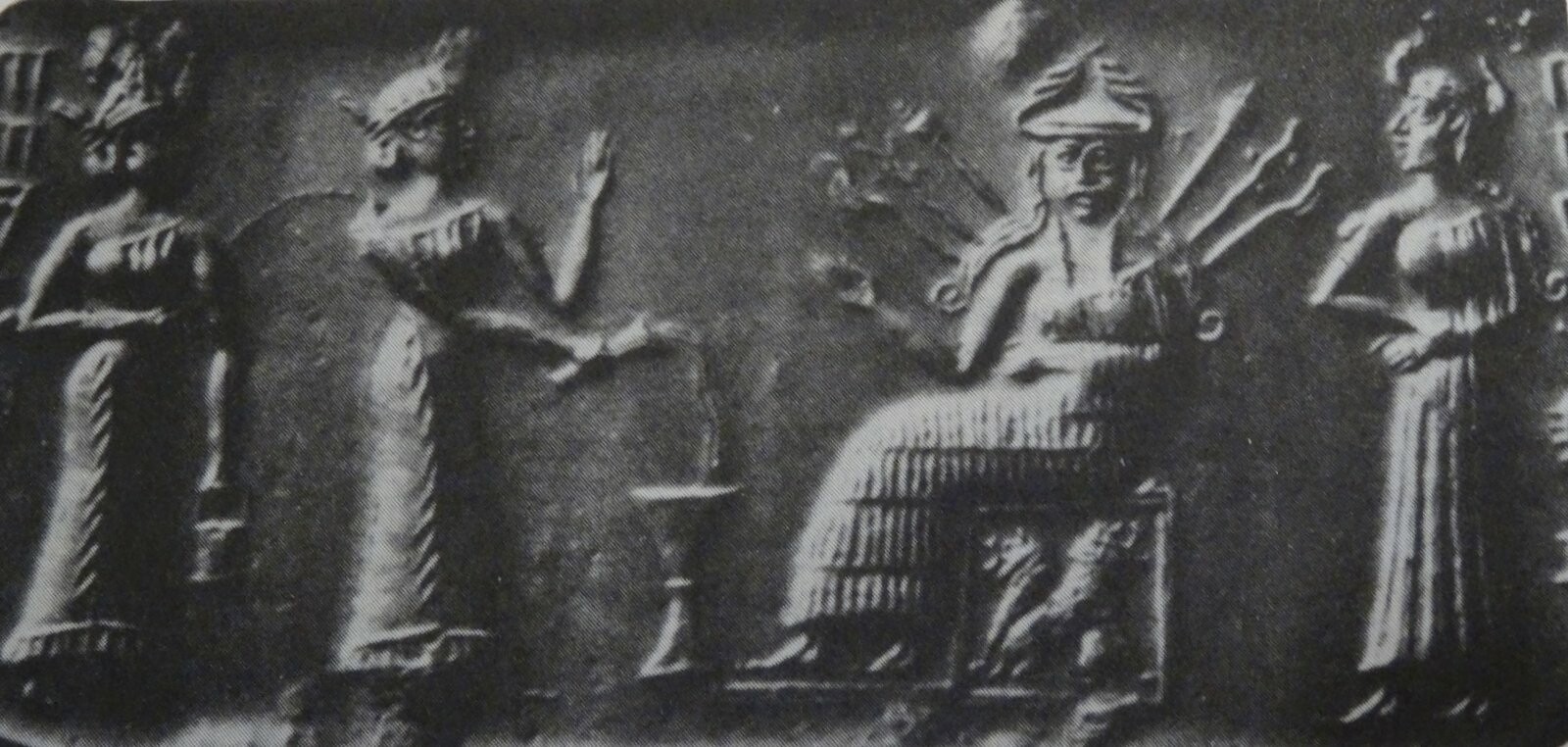
Inanna on her throne. Image from Inanna, Queen of Heaven and Earth by Diane Wolkstein and Samuel Noah Krame.
Nabra: That’s so fascinating and really also confirms what we’ve been saying in this season a lot, which is that MENA and SWANA cultures have had theatre for really since the dawn of time, since the dawn of civilization. There are so many rich theatre traditions, and also that there’s just so little scholarship that centers them. Again, you started by saying that there’s a lot of understanding of European influence on Iraqi theatre, but actually it’s the other way around in many cases. And so it’s really exciting to also hear how that scholarship comes to be that the linguistics are actually a way into these ancient traditions and who influenced whom since many times the texts aren’t available.
I’d love to know, you talked about two ancient texts, how do they exist today? How were they found and are they still available? I’m like immediately like, I need to read these ancient texts, these ancient plays.
Amir: I think they are available. I think they’re translated as well to English and to different languages. So for sure you can have access to them in English and other languages. It’s written as a dramatic dialogue. And those who support the idea that theatre existed in ancient Mesopotamia say that these types of texts were not meant to be read. They’re meant to be performed in front of the audience. And they have their own evidence as well. But I don’t want to deny the other fact that some of the scholars say, no, we don’t have a performance in the modern sense back in ancient Mesopotamia. However, we have these theatrical enactments in the festivals and rituals, et cetera. But after all theatre people believe that theatre in general actually originated in rituals, whether in Greek theatre or Romans or Western theatre or an ancient, I mean, Middle Eastern theatre.
Marina: Well, and so you mentioned church drama, and you have an article called “The Birth of Modern Iraqi Theatre Church Drama in Mosul in the Late Nineteenth Century,” which is available on Arab Stages for the audience to read. And we’ll try to link it in our transcript as well. [Note: the article is not currently available on the Arab Stages website as the publication migrates its content.] But it would be great to discuss. Can you define what church drama is And how that appeared in Mosul? And how did it evolve into other forms of theatre? I’m just really unfamiliar with “church drama” as a term.
Amir: Well, this article was co-authored, myself and my colleague, professor James Al-Shamma. He’s a professor at Belmont University in Nashville. Church drama is drama written by Christian priests for didactic moral and religious purposes. And during the late nineteenth and early twentieth century Iraqi theatre, particularly church drama, emerged as a vehicle for moral and religious teachings. They were influenced by Western theatre practices, particularly French literature and playwrights like Molière. At that time, Iraqi playwrights, many of whom were Christian priests, crafted the plays, as I said, with didactic and moralistic themes. The first known Iraqi playwright was Hanna Habash, a Dominican priest who composed a trilogy of one act plays in 1880 inspired by Biblical stories. These plays aim to educate the audience about the Bible and potentially attract conversions to Christianity. At that time, the Ottoman Empire ruled the Arab world, part of the Arab world, in Iraq in particular, despite the Ottoman restrictions on Muslim conversion.
So Hanna Habash’s works lacked comedic elements typical of medieval morality plays but followed a similar structure. And as for the other playwrights, I mean the subsequent Iraqi playwrights, including clergy like Naum Fatihallh Sahhar, expanded beyond biblical adaptation to address social and political issues. For example, his play Latif and Khoshaba or Latif wa Khoshaba, adapted from French work, critiques the class system through a story of a privileged landlord’s son who undergoes transformation after discovering his true identity and experiencing the hardship of the poor. So these early Iraqi playwrights, often multilingual and well-educated priests, played significant roles in shaping Iraqi theatre by blending Western influences with local themes and concerns, marking a shift from religious to sociopolitical narratives.
Through indirect and symbolic representation rooted in folklore, mythology, and history, playwrights indirectly critique the dominant nationalist and communist factions while evading retaliation from the Ba’athist regime at that time.
Nabra: So we’ve talked about modernism kind of, late nineteenth century, which is not extremely modern, but obviously much more modern than the 1200s, 1300s BC is scripts that we have as well talked about... Can you talk about what differentiates modern and classical Iraqi theatre maybe in its form, in the kinds of stories that are told?
Obviously, you talked about there’s very different religious themes, although it seems like there’s a religious or spiritual aspect to both the classical and modern forms that you’ve talked about when it comes to ritualistic theatre as well as Christian theatre. But yeah, what kinds of stories told in how they were performed, what kind of audience perhaps, et cetera, what makes these different? How did they evolve over time in Iraq?
Amir: Well, the theatrical journey in Iraq is influenced by a complex interplay of certain factors such as politics and history within the Arab region, because Iraq is part of the Arab region. But I wouldn’t do justice to summarize the whole journey except by saying that, as a true theatre in the modern sense, it emerged as a morality place and a Christian place in Mosul. So emerging in the early nineteenth century, Iraqi theatre initially embraced these plays, the morality plays, before evolving to draw inspiration from Arab and Islamic history. During the early twentieth century, Iraqi theatre became a platform for promoting Arab nationalism and celebrating Islamic heritage, especially in defying Turkish and British hegemony. And despite the government opposition and censorship at that time, playwrights persisted in crafting narrative that exalted Arab identity and resisted external domination. So that’s the early twentieth century. And for the period between forties and fifties witnessed the maturation of political theatre in Iraq, which coincided with the monarchy’s alignment with the British interest.
And at that time, leftist and Marxist playwrights emerged as pioneers, as pioneers who utilized the stage to incite revolutionary sentiment against the ruling monarchy. And then we have the phase of after the revolution, 1958, we call it Abdi Kareem Qasim Revolution, 1958 to Saddam’s consolidation of power in 1979 where theatre reflected the ideological and power struggle within Iraqi politics between the nationalist and communist. And through indirect and symbolic representation rooted in folklore, mythology, and history, playwrights indirectly critique the dominant nationalist and communist factions while evading retaliation from the Ba’athist regime at that time. And then under Saddam’s rule, which has started from, as we said, 1979 till the fall of the regime 2003, Iraqi Theatre underwent a transformation and was characterized by particular types. For example, we have the agitprop theatre glorifying the war against Iran, aligning with the state propaganda efforts.
And then we have another type of theatre, we call it al-Masrah Tijari—commercial theatre. And this flourished also during Saddam’s time, offering lighthearted comedies and musical performances to distract audiences from the harsh realities of the war and the political situation within the country. And then we have the academic theatre venturing into experimental territory, attempting to challenge the regime’s policies, but through indirect critique. It’s a long journey for theatre in Iraq, and I hope I have more time to summarize it and to tell you the difference between each era and the difference between classical and the modern theatre in Iraq. But as you said, classical theatre is usually rooted in rituals and religious themes and moral themes as well. But because of the situation, I mean the political situation in Iraq, starting from the early twentieth century until now, made theatre in Iraq to address different issues, mostly political and mostly related to the events and political realities within the country.
Nabra: And that really does reflect how you laid that out. It felt like I was getting a brief history on Iraq and Iraqi politics in addition to or through the medium of theatre and art, which is such a beautiful way to frame and to examine theatre history in parallel with the evolution of the country and its own politics, which again, we see across the region as well.
Marina: I’m wondering if, can you talk to us a little bit more about agitprop versus the other forms of theatre, if you have information on that? I know we’re also asking you questions that truly span all of Iraqi history, so...
Amir: Well from its name, as you know, “agitprop,” it supports the state’s propaganda for war against Iran. And this war lasted from 1980 to 1988, eight years. A lot of people were killed in the war from both sides. So the theatre was used as a tool to promote this type of ideology, especially the Ba’athist ideology and how we should defend our country against the enemy, demonizing the enemy, et cetera. And also this kind of theatre tried to agitate the public to create this kind of zeal and passion to protect the country, to defend it against those enemies, which actually were demonized in the discourse during Saddam’s time, I mean the Iranians. So, that is the agitprop theatre, and unfortunately, many theatre artists were forced to participate in this type of theatre while others decided not to and resorted to experimental theatre where it’s not easy to see unless, I mean the message, a quite experimental and sometimes symbolic, and even though some of them got in trouble because of that as well.
The other type is, as I mentioned, commercial theatre. Commercial theatre, al-Masrah Tijari, is from its name that profit is the main goal for this. However, there were comedies presented at that time that were really popular, and a lot of people liked them. A lot of people engage with these comedies. So it’s not fair to call all these comedies as a “commercial” or what theatre critics in Iraq call them, “low comedies.” And we talk about, I mean, my colleague, professor James and myself, we are discussing all these things, all these types of theatre in our book that will be coming soon, hopefully by the end of this year, which is the first full-fledged book, critical book, critical study on theatre in Iraq after 2003, with the University of Iowa Press.
Contemporary Iraqi theatre is characterized by lamentation, lamentation over the loss of a homeland, which is devastated by an occupying force that was widely perceived as barbaric, and a homeland torn apart by sectarian conflict and terrorism.
Marina: That’s amazing. Mabrouk. I can’t wait to read the whole book, and I’m glad we’re getting a teaser here. We feel very lucky.
Amir: Thank you.
Marina: You write about and have translated plays from Iraq. And I was wondering, because I’m now starting to dip my toes into translation too, so I’m always like, “Oh, how is this? What is this process like?” But I would also wonder if you could share an overview of how you describe contemporary Iraqi theatre, but also the process of translating. I don’t know, perhaps it’s quite straightforward for you. For me, I’m always like, “Oh, there’s so many choices from some of these roots and from some of the context,” but just some of the plays that you’ve translated, and maybe more about contemporary theatre in Iraq?
Amir: Contemporary Iraqi theatre is characterized by lamentation, lamentation over the loss of a homeland, which is devastated by an occupying force that was widely perceived as barbaric, and a homeland torn apart by sectarian conflict and terrorism. So in contemporary Iraqi theatre, playwrights lamented the loss of Iraqi identity. The plays of this period explore many themes and issues including terrorism, immigration, the status of women, corruption—I mean the state corruption—administrative corruption, protest movements such as the Tishreen Revolution in October in 2019, and also themes like death and madness. Playwrights use all kinds... Playwrights and directors used all kinds of dramatic and theatrical styles. So theatre after 2003, which is called contemporary theatre, used different styles, as I said, of theatre. For example, they used Theatre of Biography, Masrah al-Sirah, which dramatized the lives of secular and religious figures. They used al-Masrah al-Husseini, which is influenced by Ashura rituals. And that stages the death of the Shia Imam Husayn and the Battle of Karbala.
We have the Theatre of the Event, Masrah al-Hadath, which honors the victims of terrorist attacks. So this is kind of a site specific where if we have a terrorist attack on a certain place, they will go to that place after the attack to produce a play and stage it. So it’s like a site specific. And then Theatre of Daily Incidents, Masrah al-Waqai’, which portrays the impact of terrorism, sectarianism, and political turmoil on the daily lives of ordinary citizens. Others include also fantasy, surrealism, metatheatre, physical theatre, dark comedy, political satire, participatory theatre, adaptation of Western Classic, and incorporation of mythology in contemporary Iraqi theatre. And in a nutshell, theatre in Iraq is, to a great extent, a political theatre, and contemporary playwrights are committed and have been committed since, I would say since the early twentieth century, to engage with the issues of the day and taking part in this sociopolitical discourse.
Marina: I have a question about, and this might be a silly question, I’m sorry, about the term “terrorism” though. I’m wondering for the terror attacks, are they, because the United States has kind of terrorized Iraq in many ways, and I’m wondering, are these victims who’ve died at the hands of US militarism and imperialism, or are they from... Yeah, can you speak more to that?
Amir: That’s right, yeah. So it includes both terrorism committed by the US for example, Abu Ghraib, the prison and the torture, and what happened in Abu Ghraib, that’s considered terrorism, terrorist act. And also include extreme Islamist terrorism as well. So like suicide bombings and explosions, et cetera. And especially the recent ISIS terrorism and violence against, let’s say, the Yazidi women, against Christians in the North, against Iraqis in general. So, both of these types of terrorism.
Marina: Thank you for expanding that.
Amir: Sorry, I wanted to mention that. Speaking of translation, we are translating another book, the second anthology. So we, Jim and I, I mean translated, the first volume which was in 2017 with Metheun drama. And we have another, I mean, the second volume is coming hopefully also in this year. And the second volume will contain ten plays as well from playwrights, male, female within the country and in exile, different themes, different issues with an introduction outlining the main issues and types of theatre after 2011, which is after the withdrawal of American troops from Iraq.
Marina: Wow, that’s very exciting. We will be very excited to read that and especially after that very pivotal time period from 2011 on. Yeah, Masha’Allah, congratulations. That’s really cool.
Amir: Thank you.
Marina: You’re also so busy. You have your monograph coming out this year. You have this other translation coming out this year. It’s very incredible.
Amir: Well, try to, the thing is there is very little scholarship in Iraqi theatre in English. So for me it’s a motivation, but at the same time a concern as a scholar. So I feel like I am more responsible to produce this knowledge for the English readers to learn about the Iraqi theatre and what’s going on in Iraqi drama theatre.
Nabra: Absolutely. And one of the things that we have found in a lot of theatre traditions of the region is that there are really well-known stories or a specific story, whether that’s a true story or some fictional characters that can pervade theatre historically and into contemporary theatre. We were wondering if there are any such stories that pervade Iraqi theatre, maybe that even we might know. We’re finding all of these stories, as you said, and forms that are adopted by Western traditions that folks in the US might know more about, or additionally some stories that are so well known in that region or that country that should be known more widely across the world. So I was wondering, are there any stories that are kind of told and retold and retold in Iraqi theatre from classical times to today?
Amir: Well, there are many stories. But from classical times to this day, I’m not sure, but I can see that Iraqi playwrights, most of the Iraqi playwrights, they sometimes use mythology, Iraqi Mesopotamian mythology, to say that we are people of history and civilization and that whatever happens to us we’ll not only survive, but we have resilience. We will mount and come out of these upheavals and violence and wars as strong people, and we’ll continue because we are rooted in a strong history and civilization. There is a pride, as you know, in Iraq being the cradle of civilization, and there is the look to the other who destroyed their country. And we talked about this in the book as well, how the image of the other, the image of the Americans as, I mean the American policy and politics and politicians and the people who support war, as barbaric and not the other way around. But stories are different stories, I can tell you it depends on types of theatre as I said.
One of the stories is the story of the immigrant who is forced to leave his country or their country. And that’s a very recurring story that they go outside their country looking for refugee, seeking asylum, but they’re still rooted in their memories and they want to come back. But I would say every type of theatre, in every type of theatre in Iraq, they have certain recurring stories. But unfortunately, the current theme is lamenting the loss of homeland, lamenting the loss of al-Watan, you know the word al-Watan (homeland). And that’s rooted in our Arab heritage, we call it al-Waquf ala al-Atlaal, “standing at the ruins.” It’s a very shared theme within Arabic literature and culture. But recent plays address issues, for example, related to Yazidi women or the loss of a son in the war. So I can’t tell you, unfortunately, I can’t tell you that there is one only story, there are many stories however, they all show resilience. They all show, even though, as I said, lamentation and tragedies and trauma but there are plays who show resilience and pride.
Theatre in Iraq is, to a great extent, a political theatre, and contemporary playwrights are committed and have been committed since, I would say since the early twentieth century, to engage with the issues of the day and taking part in this sociopolitical discourse.
Marina: That’s so helpful to know. This season, we did an episode on Majnun Layla because it’s a piece that we like and have seen in different contexts and different films have emerged. But it’s funny because every time we talk to someone from the Middle East, they’re like, “Oh, yes, that’s our story.” I’m like, “Oh, it’s actually this tale that has really emerged as one that everyone claims in different ways.” So we’re just interested also in, I love that you sort of gave us this archetype of there’s an immigrant who is doing this, who is, and now there are lamentation pieces for people who’ve lost their homeland. I think that these pieces give us a lot of information about what’s happened in history and happening now, just as people having an obsession with Majnun Layla, I think also tells us something throughout time of this love story.
Amir: Of course. And in Iraq theatre as well, you’ll find examples of plays where you find Gilgamesh, the story of Gilgamesh. That’s also the other, for example, we have a playwright, his name is Khazal Al Majidi, most of his plays actually, he draw on mythology, Iraqi mythology, Mesopotamian mythology of the gods and the kings, et cetera. So you’ll see plays who borrow from the rich history of Mesopotamia in the plays and adapt them to the current situation in Iraq as well. Meanwhile, we have also playwrights, Iraqi playwrights who do adaptation or reworking of Western classics like Shakespeare, Lorca, or Genet or all these.
Nabra: And we wanted to also talk about a different element of scholarship or a more specific element of scholarship that you explore. I mean, we’ve already gotten you to summarize your entire book that’s coming up. So thank you for trying to do that. You’ve given us an amazing tidbit, and I know there’s just so much more. So we’re excited for your book coming out. But another element of scholarship that you’ve done a lot of is collaborating with Afro-Iraqi scholars and exploring Afro-Iraqi rituals. Can you share what that research looks like and also maybe some examples of what those rituals might look like?
Amir: So our research on Afro-Iraqi rituals—and by the way, we have Afro communities within the Arab world. Like in Palestine, we have Afro communities. We have in Syria and Iraq and all over the Arab region—so our research on Afro-Iraqi rituals involves a collaboration with scholars from the Afro-Iraqi community to explore and document their rich cultural heritage. And we’ve conducted in-depth interviews with the key community members and practitioners of these rituals to gain valuable insight into their significance and meaning. Also, we have analyzed the etymology, the etymology of songs and names associated with these rituals to deepen our understanding. So Afro-Iraqi rituals have been maintained through orature, which is the oral transmission dependent on the private nature of the host communities. So they’re not written in any document, they’re just orally transmitted through the community members. The importance of these rituals lies in their restorative power.
They maintain communal identity, foster empowerment and transformation. They’re held for special ceremonial purposes such as healing spiritual illness while honoring the presence of the Zaar—the Zaar is the visiting spirit—or treating a sick person, honoring a dead person or their ancestors. There are many purposes for their rituals. So in our research, we found out there are two predominant theories concerning the origins of these rituals. One points to Africa, specifically Kenya and Tanzania. While the other indicates local beginnings around Basra, especially the Sufi circles in Basra. And the rituals are, for example, Chitanga, Wogendo, and Liwa are believed to have Kenyan origins. And the ritual Engaruka potentially derives its name from a town in Tanzania, Great Rift Valley. The second theory argues that the origin of many of these rituals, especially rituals like al-Sada, al-Waya, are local and refer to the period of Sufism and Dhikr, Halaqat Dhikr as a ritual and it used to be practiced in Basra.
So through our research, we aim to shed light on these rituals, which are often overlooked, and also on their role in preserving Afro-Iraqi cultural identity. Our findings highlight the resilience of the Afro-Iraqi community in the face of oppression and discrimination, as well as the enduring significance of these rituals in fostering communal unity and spiritual well-being.
Nabra: Thank you so much for sharing more about that. It’s really fascinating, very important research as well. I think a lot of our Afro communities in the region are overlooked, of course, due to just pervasive anti-Blackness everywhere. So we’re thankful for you for going into that and collaborating with so many Afro-Iraqi scholars as well to explore this in a really dramaturgically strong way too. We’d love to end with just getting to know more about your journey into scholarship, because again, you’ve talked about how, yeah, there’s this responsibility to bring this scholarship into the English language, and we’d love to know why did you get interested in Iraqi theatre specifically, and how did you first get started or interested in this? And what that kind of journey might have looked like into the place you are today as kind really an epicenter of Iraqi theatre scholarship?
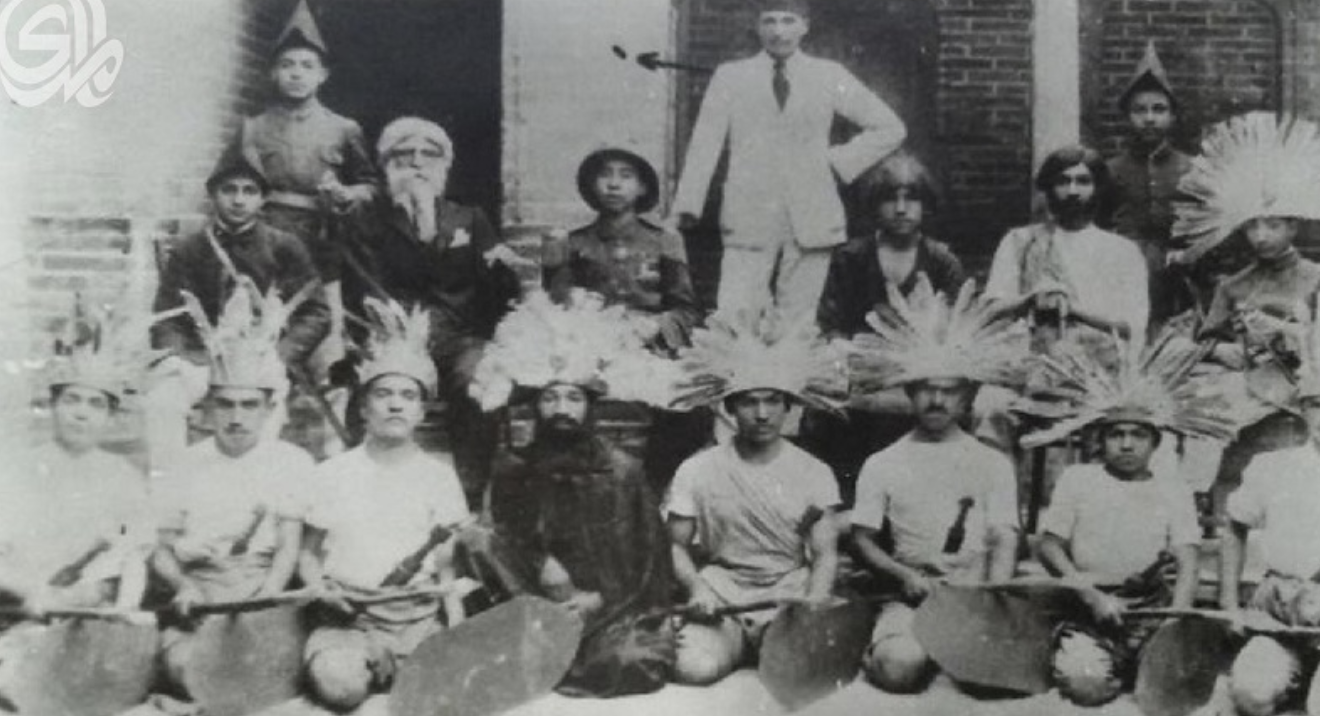
Pioneers of the Iraqi tentative political theatre during the sixties. Image via the Arab Theatre Institute.
Amir: Yeah, thank you for the question. I actually finished my Masters degree in Baghdad, University of Baghdad. I wrote my thesis on Samuel Beckett, so it was not Iraqi theatre in the first place. And I got accepted as PhD student with a PhD scholarship at York University here in Canada. And I started to look beyond English literature and colonial literature, and I started to reflect, look at Iraq and reflect on how theatre in Iraq responded to the current situation, to the invasion, to the occupation, et cetera. So I shifted my attention and my interest from English literature to be more relevant, especially connected to my own country and my reality as an Iraqi who studies theatre in Canada. So I shifted my attention and interest and started to explore representation of political violence in theatre written about Iraq and written in and outside Iraq. So I wrote my PhD thesis on that.
And then the other thing I also was influenced by, I read the Pedagogy of the Oppressed by Paulo Freire, and then that led me to another book, which is Theatre of the Oppressed by Augusto Boal. And that’s another one of my really strong interests is Theatre of the Oppressed; now I call myself Theatre of the Oppressed practitioner. I’ve been involved in Theatre of the Oppressed in Iraq and in Canada, in the US as well. I’ve done a lot of experiments of Theatre of the Oppressed with forum theatre, legislative Theatre, all of these. So yeah, so back to your question, that’s my journey in a nutshell.
Nabra: Can we actually hear a little bit about the Theatre of the Oppressed work that you did in Iraq? I’m so interested in what that looked like and maybe some of the outcomes there?
Amir: Of course, interestingly, the last project I did in Iraq, Theatre of the Oppressed, was with the Black community. We used forum theatre to address anti-Blackness in primary schools. So I worked with children, and we did a play called Colors. It was really an amazing experiment for me and experience. It was very impactful. That’s one of the projects I did lately in Iraq to address anti-Black racism, and the kids were part of that experiment. So that’s one. And then I did a few... I was actually the first one who brought Theatre of the Oppressed to Iraq in 2009 as a practice, as a full practice. It was mentioned in books very briefly, in books in Iraq, but as a practice to be seen and to be experienced, I brought it with the University of Basra students, theatre students, and we trained them, and then we did shows, performances across the campus, and then more and more of Theatre of the Oppressed. I became really interested in that.
Yeah, so my last one, my latest project in Theatre of the Oppressed is here in Canada. And if you like I will share it with you. We collaborated with an organization called Independent Jewish Voices to address the conflict between Palestine and Israel. So, we did that, and that was my latest forum theatre project.
Marina: Was that during the current situation?
Amir: Yes, it is very recent, yes. Yeah.
Nabra: That’s so exciting and thrilling to hear about you as a practitioner as well as a scholar. So I’m glad we got a little window into that work that you’re doing as well.
We’re at the end of our time. I’ve learned so much, and I’m so excited to jump into some of these plays and these ancient scripts that you talked about. So I’m really excited that we have kind of also a jumping off point, I think, for future conversations on ancient Iraqi theatre and ancient theatre. So thank you so much for illuminating us on those topics.
Amir: Thank you very much for having me. Unfortunately, we don’t have time to delve into all these details, but I appreciate the opportunity to meet with you and share with you what I have about Iraqi theatre. Thank you so much.
Marina: Thank you. And we’re looking forward to your book and the next Anthology of Translated Plays as well.
This podcast is produced as a contribution to HowlRound Theatre Commons. You can find more episodes of Kunafa and Shay and other HowlRound podcasts by searching “HowlRound” wherever you find podcasts. If you loved this podcast, please post a rating and write a review on your platform of choice. This helps other people find us. You can also find a transcript for this episode, along with a lot of other progressive and disruptive content, on the howlround.com website. Have an idea for an exciting podcast, essay, or TV event the theatre community meets to hear? Visit howlround.com and contribute your ideas to the Commons. Yalla. Bye.
Nabra: Yalla. Bye.

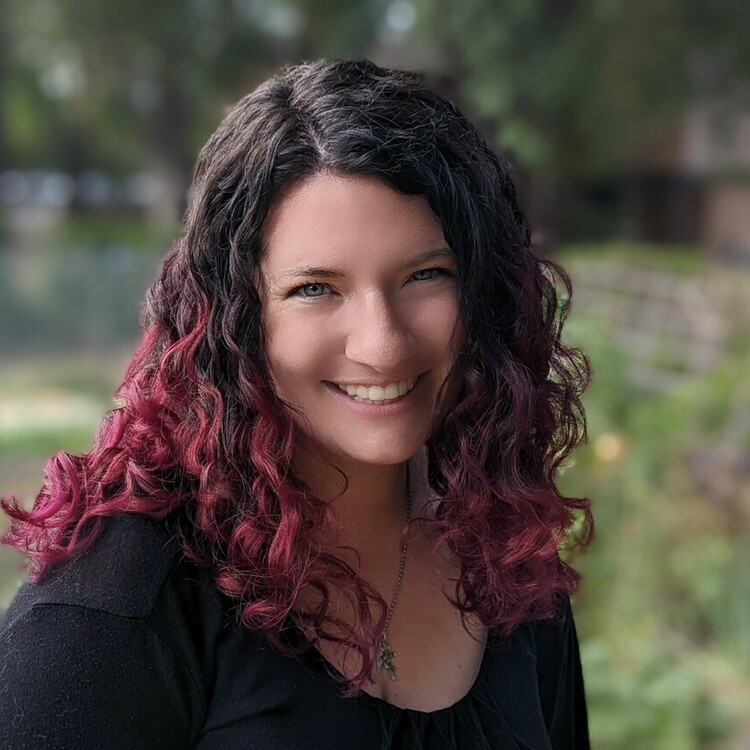
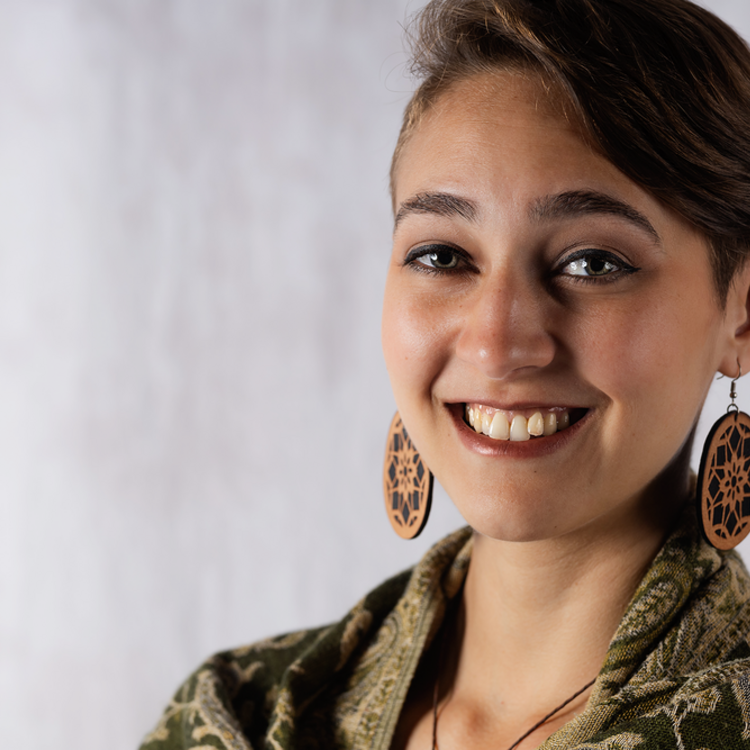
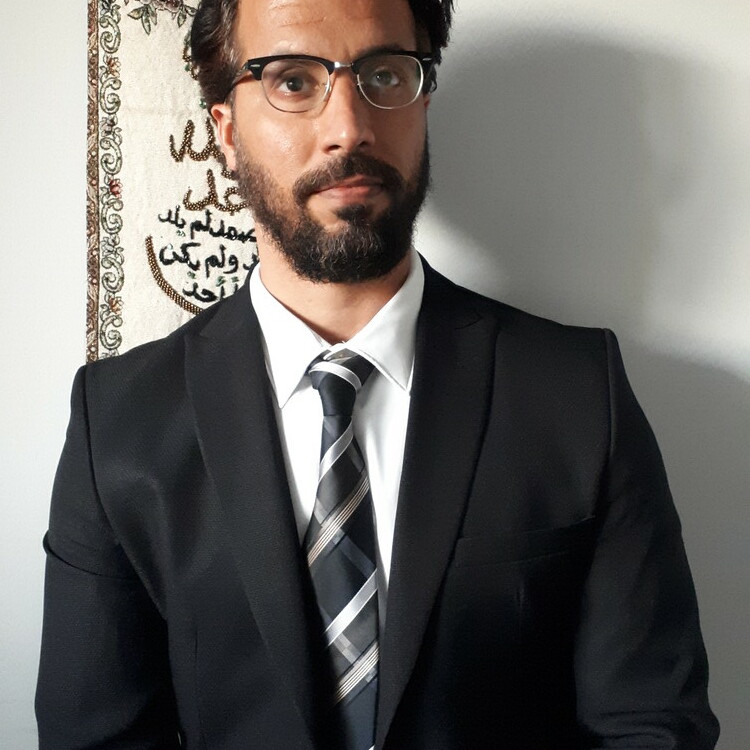
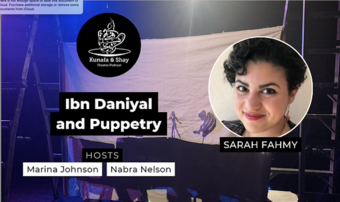



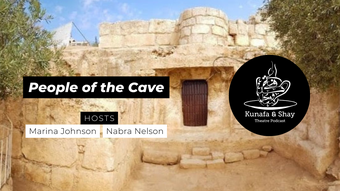
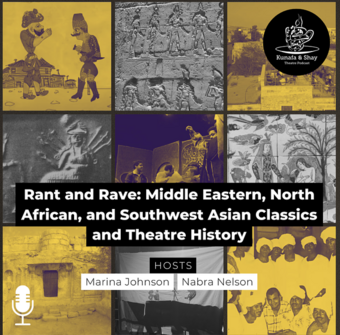
Comments
The article is just the start of the conversation—we want to know what you think about this subject, too! HowlRound is a space for knowledge-sharing, and we welcome spirited, thoughtful, and on-topic dialogue. Find our full comments policy here
Thank you!! This is so helpful—we start with Mesopotamian and Levant-region theater in my theater history class, and it has indeed been a struggle to find resources in English that are also written by theater scholars. This interview is just in time to add some resources to my syllabus for this semester. Thank you for this generous sharing!